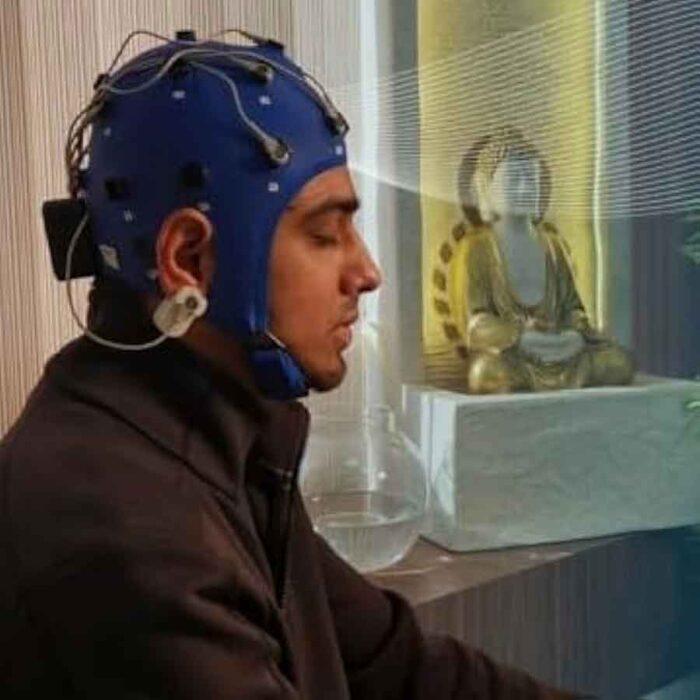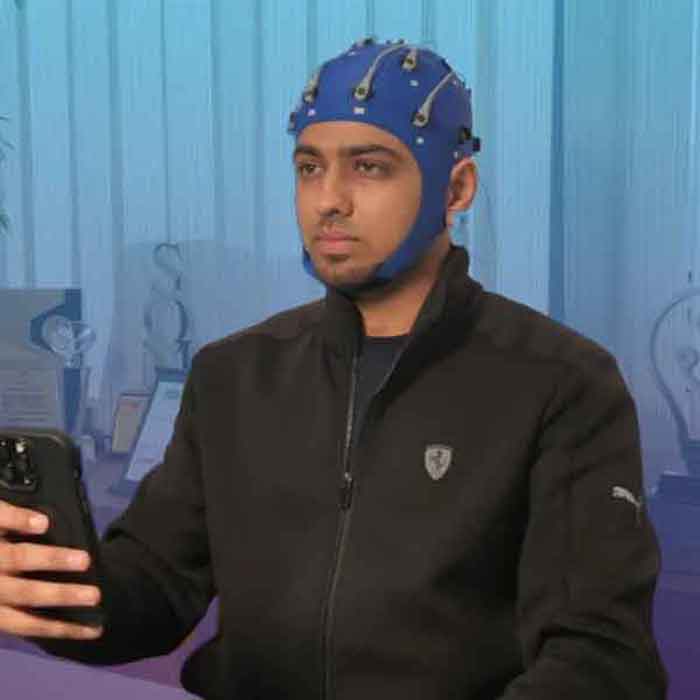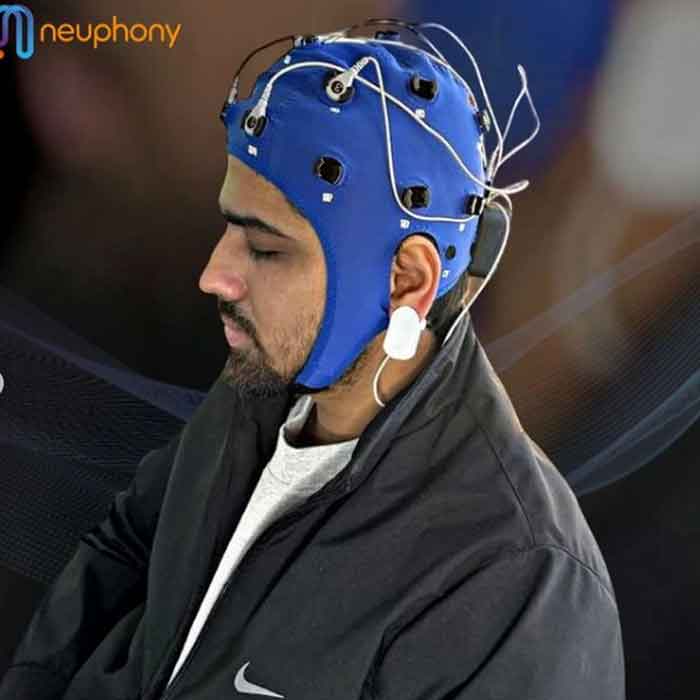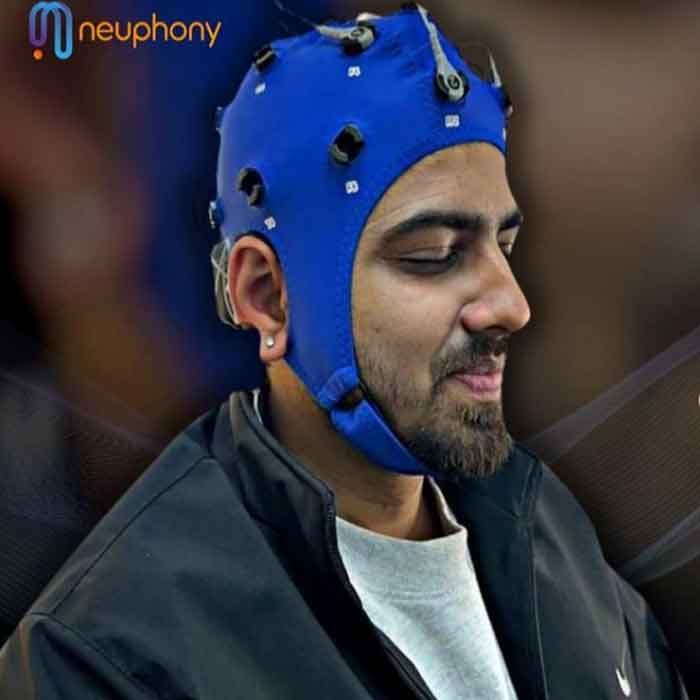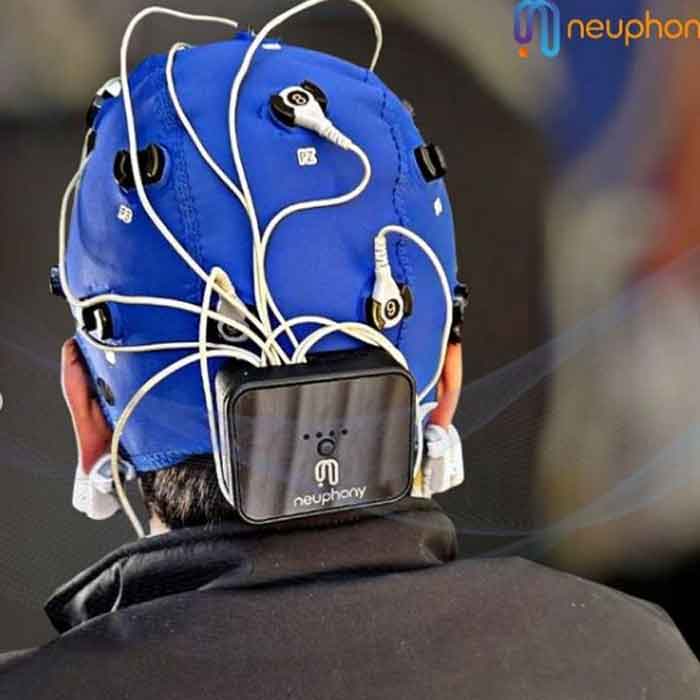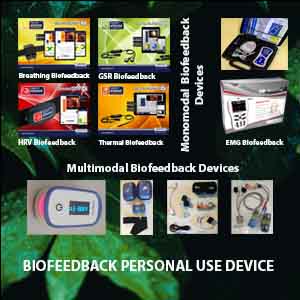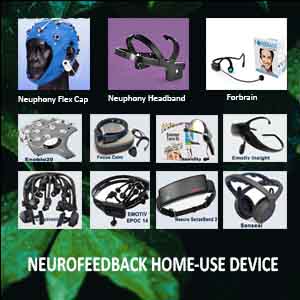Description
Experience the transformative benefits of home neurofeedback therapy with the Neuphony EEG Cap, designed to bring the power of neurofeedback into the comfort of your home. Neuphony Flex Cap for Home Neurofeedback captures data through 10 dry EEG sensors, trains your brain to deal better with daily distractions, and helps you become more efficient. Neuphony is a CE-certified, ROHS-compliant, ISO-certified product. The efficacy rate is 98% compared to a gold-standard EEG device. The data you get from Neuphony is highly accurate and backed by top research organizations like DRDO, CDAC, etc.
The device has 8 EEG channels with movable electrodes distributed in the brain’s frontal, parietal, and occipital lobes with the flexibility to move the sensors according to 10-20 systems based on the requirements. These are dry sensors and do not require any gel or saline solution.
Key Features of Neuphony EEG Cap for Home Neurofeedback
Advanced EEG Technology for Home Neurofeedback
Experience the pinnacle of EEG technology with the Neuphony EEG cap for home neurofeedback. This advanced device offers exceptional signal quality through its dry, flexible electrodes, ensuring reliable performance. The cap integrates seamlessly with EEG brain scan systems, providing accurate EEG monitoring essential for neurofeedback training.
It comes equipped with the Neuphony Desktop Application, allowing users to control and visualize their brainwave data effortlessly. The cap features movable electrodes, with ten sensors that can be placed on different parts of the brain. Connectivity is flexible, offering both Bluetooth and USB cable options, ensuring smooth and uninterrupted data transmission.
The Neuphony Flex EEG cap is an 8-channel device featuring 8+2 dry EEG sensors, eliminating the need for gel or saline solutions. Additionally, its rechargeable battery supports up to 8 hours of use, making it a convenient and practical tool for extended neurofeedback sessions.
Unparalleled Precision and Comfort with Neuphony EEG Cap
- The Neuphony EEG Cap for Home Neurofeedback is a state-of-the-art biofeedback device designed to measure and record brainwave activity accurately. It offers a step into mind control, allowing users to train and understand their brain’s activities with unparalleled precision.
- It features a flexible and comfortable cap design that conforms to the shape of the user’s head, ensuring a secure fit and reliable signal acquisition.
- The Neuphony Flex EEG Cap for home neurofeedback is equipped with multiple electrodes strategically placed across the scalp to capture electrical signals generated by the brain. These electrodes are connected to a compact and user-friendly control unit, allowing for seamless data transmission and analysis.
- This device incorporates advanced signal processing techniques to filter and amplify the EEG signals, enhancing the signal-to-noise ratio and minimizing interference. The result is precise and reliable brainwave data, providing valuable insights into cognitive states, mental processes, and emotional responses.
- The Neuphony Flex EEG Cap for home neurofeedback has a user-friendly interface that simplifies setup and operation. The accompanying software provides intuitive controls for adjusting recording parameters, visualizing data, and conducting preliminary analysis, making it accessible to experienced researchers and novice users.
- The strength of Neuphony is that it has a traction mechanism that can fit different head sizes and has replaceable sensors. If one sensor is broken, replacing it with other devices is impossible, but with Neuphony, you can replace it yourself.
- Backed by top research institutes: The quality and reliability of the data are unquestionable, as top research institutes like CDAC, NIMHANS, IISC, and IIT use them.
What cognitive states measure Neurophony Flex EEG Cap
Neurofeedback is a biofeedback technique that harnesses brainwave monitoring technology to assist individuals with various mental and physical health conditions. Neurofeedback helps regulate mood, behavior, and physiological functions by utilizing electrical signals from the brain, offering a safe and drug-free alternative to traditional treatments. It promotes neuroplasticity, the brain’s ability to reorganize and adapt throughout life, by forming new neural pathways in response to experiences. Neuphony, with its real-time neurofeedback system called “Volume Modulation,” provides immediate feedback to users during meditation sessions, adjusting the volume based on their focus and calm levels. This feedback enables individuals to understand better their attention span, distractions, and feelings of anxiety. Neuphony’s app features user-friendly graphical representations of focus/calm levels and mood tracking.
Neurofeedback protocols
Neurofeedback utilizes various protocols focusing on different brainwaves, such as theta, alpha/theta ratio, and beta.
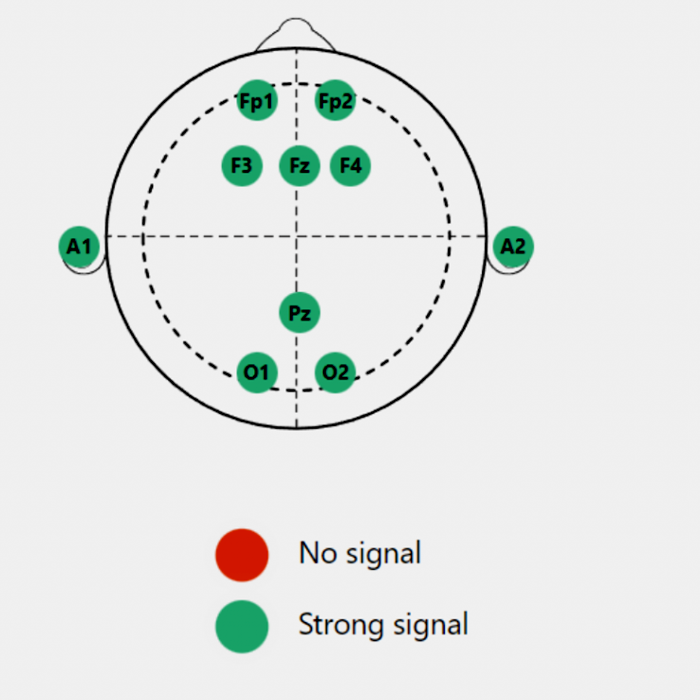 The device has 10 sensors (Fp1, Fp2, F3, F4, Fz, Pz, O1, O2, A1,A2) distributed in the brain’s parietal, frontal & temporal lobes. These are the polymer sensors that are conducive.
The device has 10 sensors (Fp1, Fp2, F3, F4, Fz, Pz, O1, O2, A1,A2) distributed in the brain’s parietal, frontal & temporal lobes. These are the polymer sensors that are conducive.
Neurophony measures the following Cognitive States:
- Stress vs Calm
- Mood Analysis
- External Focus vs Distractions
- PDR (Posterior Dominant Rhythm)
By cleverly analyzing data from three different lobes – the frontal lobe (Fp1, Fp2, Fz), which controls concentration and emotions; the occipital lobe (O1, O2), which is associated with relaxation and correlates with improved vigilance; and the parietal lobe (Pz), which controls somatosensory perception – Neuphony should be able to respond to many use cases with neurofeedback accurately.
Relaxation Levels:
When we enter a state of relaxation, our brain exhibits distinct patterns. Increased alpha band power in the occipital region at the back of the head is associated with relaxation. Additionally, a decrease in beta band power in the frontal region suggests a state of relaxation. Monitoring these real-time patterns can provide valuable insights into our relaxation levels.
Focus Levels:
A heightened focus is a sought-after mental state for many tasks. Real-time analysis reveals that increased beta band power in the brain’s frontal and parietal regions indicates heightened focus. Furthermore, decreased theta band activity in the prefrontal cortex suggests improved attention and focus. Cognitive insights regarding our focus levels can be derived from these patterns.
Vigilance:
Vigilance refers to a state of heightened alertness and attentiveness. Real-time analysis indicates that increased beta band power in the central and parietal regions of the brain suggests heightened vigilance. Moreover, decreased alpha band power in the occipital region correlates with improved vigilance. By monitoring these patterns, cognitive insights can be gained regarding our level of vigilance.
Mental Fatigue:
Mental fatigue can significantly impact cognitive performance. Real-time analysis allows us to identify brainwave patterns associated with mental fatigue. Increased theta band activity in the frontal and central regions indicates fatigue, while a decrease in beta band power in the parietal and occipital areas suggests fatigue-related cognitive impairment. By analyzing these patterns, cognitive insights can be gleaned about our mental fatigue levels.
Mood:
Our mood plays a crucial role in our overall well-being. Real-time analysis can provide valuable information about our mood states. Increased alpha band power in the left prefrontal cortex is correlated with a positive mood. Conversely, decreased beta band power in the frontal region may indicate a negative mood state. By examining these patterns, cognitive insights can be obtained regarding our mood.
Posterior Dominant Rhythm (PDR): The posterior dominant rhythm (PDR) is an alpha band rhythm prominently observed in the occipital region during relaxed wakefulness. It reflects the visual cortex’s resting-state activity. Researchers and clinicians can gain insights into the visual cortex’s baseline activity by analyzing PDR patterns, contributing to a better understanding of brain function and cognitive processes.
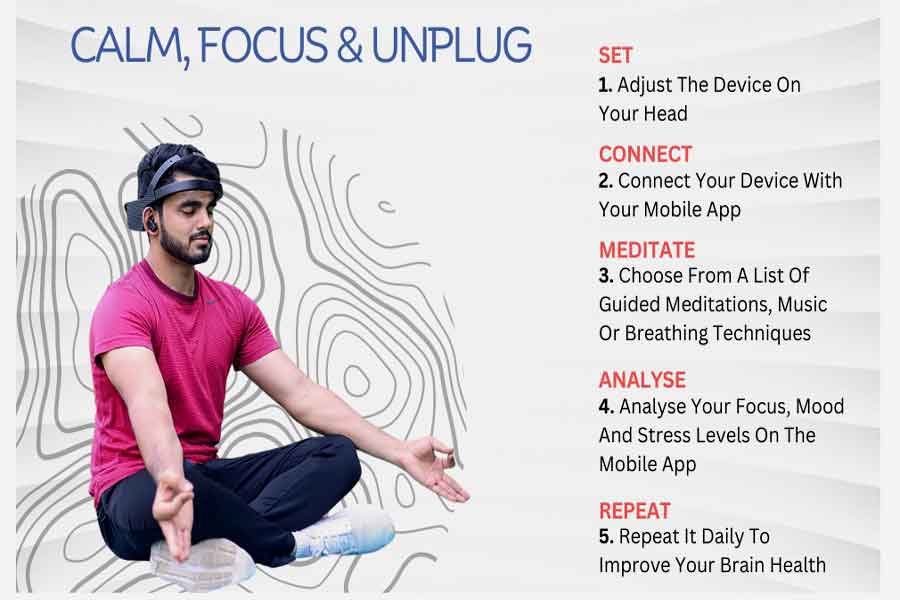
Neurophony Flex EEG Cap Application Sphere for home neurofeedback
The Neuphony Flex EEG Cap offers versatile applications across diverse domains. It provides valuable insights into brain activity and cognitive function and helps you understand the specific indications for using it for home neurofeedback. This knowledge allows you to maximize its effectiveness and tailor interventions to individual needs.
By recognizing the diverse indications for using Neuphony Flex EEG Cap and its application for home neurofeedback across different fields, users can harness the full potential of this device to achieve their goals and enhance various aspects of brain health and cognitive function. Neuphony Flex EEG Cap offers versatile and effective solutions tailored to individual needs and preferences, whether for clinical applications, research endeavors, or personal wellness initiatives.
1. Meditation and Mindfulness,
2. Stress Reduction and Relaxation,
3. Sleep Monitoring and Optimization,
4. Cognitive Training and Performance Enhancement,
5. Cognitive Rehabilitation,
6. Academic and Educational Settings,
7. Personalized Brain Monitoring,
8. Performance Optimization in Sports and Athletics,
9. Personal Wellness and Self-Improvement,
10. Brain-Computer Interface (BCI) Development.
Neuphony EEG Cap for Home Neurofeedback offers versatile and effective solutions for improving brain health, cognitive function, and overall well-being across diverse populations and settings by addressing specific health conditions and tailoring interventions to individual needs.
Neuphony Flex EEG Cap for specific health conditions:
1. Headache,
2. ADHD (Attention-Deficit/Hyperactivity Disorder),
3. PTSD (Post-Traumatic Stress Disorder),
4. Recovery after Stroke,
5. Anxiety Disorders,
6. Depression,
6. Chronic Pain,
7. Neurodevelopmental Disorders (e.g., Autism Spectrum Disorder),
8. Bipolar Disorder,
9. Traumatic Brain Injury (TBI),
10. Age-Related Cognitive Decline,
11. Substance Use Disorders,
14. Obsessive-Compulsive Disorder (OCD).

In summary, Neuphony Flex EEG Cap for Home Neurofeedback offers versatile applications in managing various health conditions. It provides individuals valuable tools for monitoring brain activity, enhancing cognitive function, and promoting overall well-being. Whether as standalone interventions or as part of comprehensive treatment plans, this Flex Cap for home neurofeedback has the potential to improve outcomes and quality of life for individuals with diverse health needs.
Technical Specification – Neuphony Flex EEG Cap for home neurofeedback
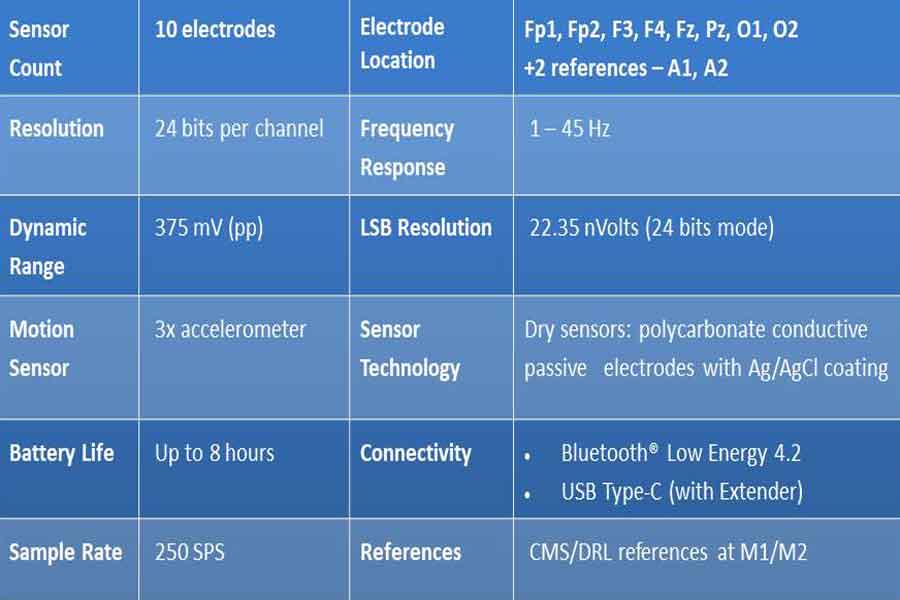
Neuphony Flex EEG Cap Desktop Application
The Neuphony Desktop Application is a comprehensive tool for researchers and experts aiming to track real-time EEG data and brain waves precisely. This advanced platform, compatible with Neuphony EEG Flex Cap, facilitates detailed EEG brain scans and effective EEG monitoring. It also serves as a biofeedback device, allowing for generating customized reports and more. It is ideal for home neurofeedback training and applications akin to mind control devices’ ability to harness and interpret brain activity.
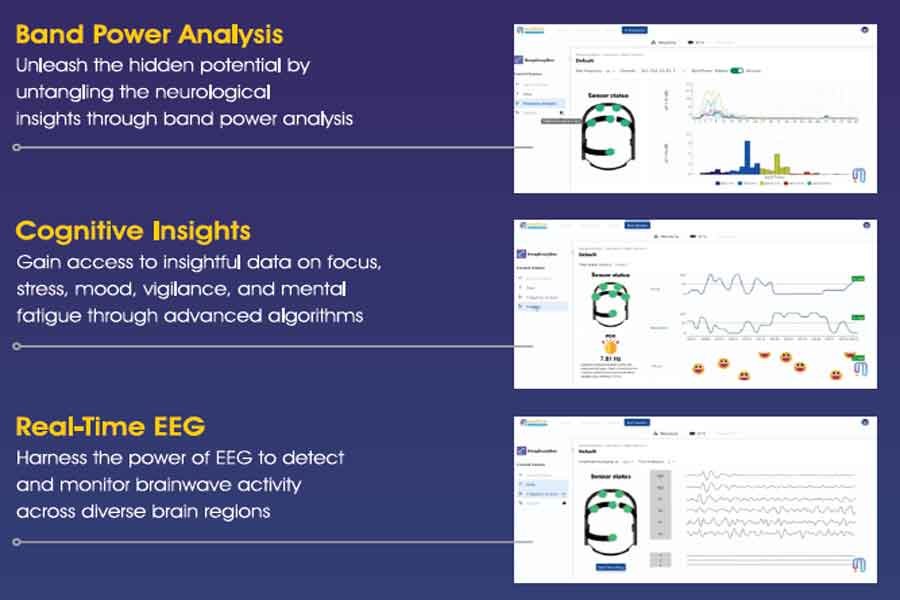
Neuphony Desktop Application subscription has the following premium features:
- Unique user ID creation, along with customized experiments and records of each user,
- Real-time sensor connectivity and quality,
- Analysing Real-time EEG data through 8 channels,
- Frequency analysis and band powers,
- Real-time measurements of cognitive states, including Stress, External Focus, Mood & PDR.
Personalized Brain Mapping with Neuphony
Neurofeedback utilizes various protocols focusing on different brainwaves, such as theta, alpha/theta ratio, and beta, which can be captured through electrodes placed on the scalp. These electrical activity patterns, known as brain waves, are measured in frequency (Hz) and amplitude (μV), reflecting the speed and strength of the waves, respectively. Moreover, neurofeedback research has demonstrated its versatility as a brain training tool. With the “volume modulation” approach implemented by Neuphony, users enjoy ease of use, a short learning curve, and instant results.
Each person has a distinct brain wiring, resulting in different thinking patterns, emotions, and brain activity. Neuphony utilizes electrical impulses known as brain waves, specifically alpha, beta, gamma, delta, and theta waves, to create an electroencephalograph (EEG) or brain wave graph. By connecting the device and attaching sensors, Neuphony creates a brain map, calculating the focus for each person. The meditation session, represented by graphs, helps determine the duration of focus throughout the session and provides insights into focus versus distraction, stress versus calm, post-dominant rhythm (PDR), and mood. Moreover, the desktop application also has a “Report Generation” feature, which can give the report after recording every session, download, print, and share it, and even add notes to it as well.
Neuphony Desktop App Features
Unleashing the Power of Neuphony’s Desktop Application
Packed with powerful features, the desktop application is designed to provide researchers and customers with valuable insights into cognitive health and neurological activity. Let’s explore some of its standout features:
Import/Export .edf files: With Neuphony, you can effortlessly import and export .edf files. This functionality lets you preview data from previous sessions, enabling seamless integration with your existing research or analysis. Consequently, you can enhance your workflow and streamline your data management process.
Via Cable/Bluetooth Connectivity: Neuphony offers flexible connectivity options. Whether you prefer a Bluetooth dongle or a C-USB cable, you can easily connect your devices and begin exploring brainwave data.
Multiple Experiments: Researchers can rejoice as Neuphony supports a variety of experiments, including P300, MMN, and AEP. These experiments provide valuable insights into cognitive health and offer a deeper understanding of brain function.
Session Playback: With Neuphony’s session playback feature, you never miss details. By recording EEG data during sessions, you can revisit and review the data for further analysis, ensuring accurate and comprehensive results.
Band Power Analysis: Neuphony empowers you to unravel neurological insights through band power analysis. This feature enables you to examine the power spectrum of brainwaves across different frequency bands. As a result, you gain a deeper understanding of brain activity.
Real-Time EEG
Neuphony takes brainwave analysis to the next level with real-time EEG capabilities and cognitive insights:
Real-Time EEG: Neuphony harnesses the power of EEG technology to provide real-time monitoring of brainwave activity. This invaluable feature allows you to observe and analyze brainwave patterns across diverse brain regions as they happen. As a result, you gain immediate feedback and insights into your cognitive states.
Cognitive Insights: Neuphony’s advanced algorithms unlock a treasure trove of cognitive insights. The application analyzes brainwave data and provides valuable information on focus, stress, mood, vigilance, and mental fatigue. This comprehensive understanding of cognitive states not only opens new avenues for research but also enhances opportunities for personal development.
Task-Based Reports: Neuphony offers task-based reports, enabling you to leverage the power of EEG data for comprehensive analysis. These reports provide detailed information on brainwave activity during specific tasks or stimuli, offering a deeper understanding of cognitive processes.
Desktop and Mobile applications work with the Neuphony EEG Headset and the Neuphony Flex EEG Cap for home neurofeedback.
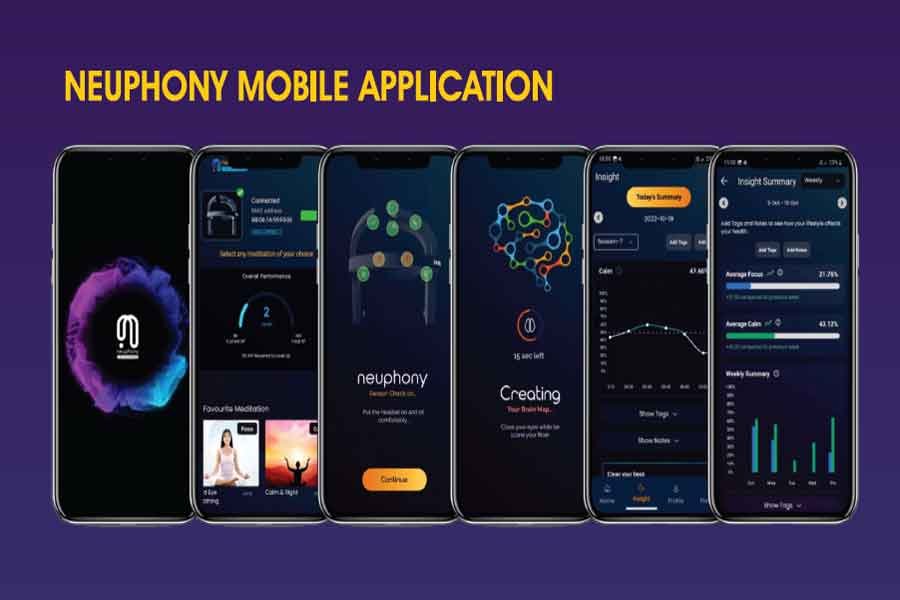
Real-time analysis of brainwave patterns provides a fascinating glimpse into our cognitive states. By monitoring and interpreting specific frequency bands and brain regions, we can derive valuable insights into relaxation, focus, vigilance, mental fatigue, mood, and even the baseline activity of the visual cortex. Consequently, this information opens new opportunities for research and clinical applications while enhancing personal development.
Cognitive Insights with Neuphony
As technology advances, the potential for real-time brainwave analysis grows even further. From optimizing cognitive performance to improving our understanding of mental health conditions, the range of applications is vast and continues to expand, holding immense promise for the future.
So, the next time you reflect on your mental state, remember that our brainwaves hold hidden treasures waiting to be unraveled through the captivating world of cognitive insights based on real-time analysis.
Video – Neurofeedback – Video Game- like therapy to help with focus, stress, and anxiety

